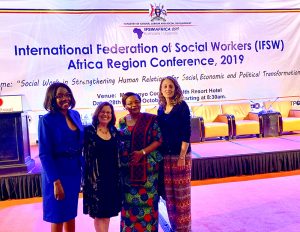Integrated behavioral health and telephonic depression care management programs create access to services despite barriers.
By Mariah LeStage
Busy work schedules, a lack of reliable childcare and transportation, and stigma are some of the challenges that can prevent people from accessing the mental health support they need. People who juggle social challenges can have a hard time engaging consistently with a traditional appointment-based clinic model.
“Just giving a phone number and telling patients to set up an appointment doesn’t work for all patients,” says Evonne Yang (SSW ’11, SPH ’14), the administrative manager of Integrated Behavioral Health Programs at Boston Medical Center (BMC).
She describes, for example, a patient with prediabetes who also had back pain and depression symptoms. His provider had been referring him to behavioral health services for three years, but attending an appointment meant he had to negotiate language barriers and three bus transfers while still getting home in time to pick up his kids. As a result of these challenges, he was never able to engage with a counselor long enough to see noticeable improvements in his mental health.
Cases like his are what’s prompted Yang and colleagues to get creative with ways to deliver behavioral health services through integrated models of care in primary care settings. Approximately 80% of individuals with diagnosable mental health disorders see their primary care physician (PCP) annually, while only 50% are seen in specialty mental health. Implementing an integrated model, where behavioral health services are part of the primary care medical home, helps make care more accessible. Patients seeing their PCP who express a need for behavioral health services can consult with co-located behavioral health resources for treatment recommendations, on the spot.
“The logistics of co-location mean more than just shared space,” says Yang, who is trained as a social worker. “It means a behavioral health clinician is part of the primary care team, sitting with a patient or a nurse, seeing what’s happening that day, and collaboratively developing treatment plans.”
An interdisciplinary background has trained Yang to listen for what pressures others are facing in their roles, she says, so that her team can design solutions that are of benefit and value to everyone in that system. Coordinated electronic medical records, for example, facilitate collaborations across team members and enhances patient care, and building strong buy-in from leadership keeps the priority on delivering patient-centric care to the people who need it most.
Integrating depression care management
The Depression Care Management program at BMC is a collaborative care model that involves proactive phone outreach to primary care patients with depression who have not yet engaged in behavioral health services. Leveraging social work clinicians who are part of the existing integrated behavioral health team, the program allows patients with depression to engage in care in a flexible way.
For the father with prediabetes and depression, a more flexible option meant he was finally able to engage in the care he needed.
“We tried a telephonic approach, and he absolutely embraced it,” Yang recalls. The care team lined up Spanish-speaking resources and for four months, worked on shared goals to cope with his pain and stress. Trained social workers delivered clinical therapeutic interventions over the phone, and followed his progress closely. At their last phone check-in, he was stable and working on his diet. He had lost 20 pounds, and had started playing ball again with his kids, which was one of his goals, Yang says.
Yang credits her public health social work background for helping her look at complex systems and see ways to allocate limited resources — a challenge that’s all too familiar for many health systems.
“We can’t staff our way out of the problem,” she notes. “So we’re trying different ways to expand the reach of the teams in a way that patients can engage with.”
This article is part of a series from the Boston University Center for Innovation in Social Work & Health (CISWH) for Boston Medical Center’s HealthCity that highlights social workers working in healthcare and public health to address the nonmedical factors that impact health, known as social determinants of health. Know of a healthcare team that’s doing innovative work involving social workers? Contact us — we want to hear your story.
